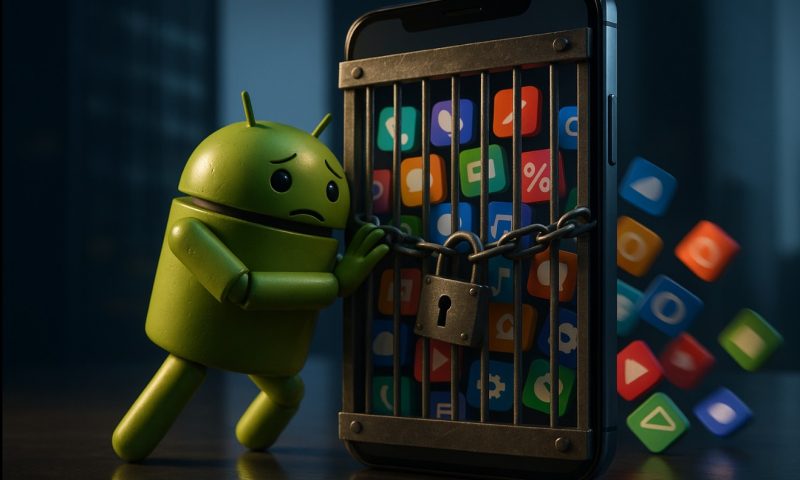The freedom Android users long championed is slipping away

For more than a decade, Android’s identity has been bound to openness. Where Apple’s iPhone enforced a tightly locked-down App Store model, Android carried the banner of user choice, allowing people to sideload applications from anywhere with a few taps. It gave power users, small developers, and open-source tinkerers a home. That defining difference is now under pressure.
Google announced in late August 2025 that starting next year, apps installed on certified Android devices will need to come from verified developers—whether they’re distributed through Google Play or sideloaded from the web. At first, this requirement will take effect in regions like Brazil, Indonesia, Singapore, and Thailand in 2026, before rolling out more broadly by 2027.
The company frames the change as an ID check, not a censorship mechanism: “like showing your passport at the airport.” In practice, it functions as a fundamental rewiring of Android’s DNA.
Why Google says it’s doing this: Malware, fraud, and “repeat offenders”
The rationale is clear and numbers-heavy. Google says apps installed outside official channels are 50 times more likely to contain malware than those hosted on the Play Store, and that 95% of malicious Android apps come from sideloading.
Verification, the company argues, creates accountability. Groups spreading fraudulent banking apps or spyware can no longer vanish behind anonymity and reappear under a new developer name when banned. If they want to distribute apps on Android, they’ll have to show their ID upfront.
This verification won’t just cover the Play Store. Google is explicitly extending it to all app installations across certified devices, whether through direct downloads or third-party markets. Independent stores like F-Droid will have to reconcile their practices with the system, potentially breaking long-standing workflows (Ars Technica).
Users see more than security: they see Apple
The backlash was immediate and sharp. Slashgear called the move a step toward making Android “a guided museum tour, where touching the exhibits is forbidden” much like iOS.
Power users on forums worried that custom ROMs, emulators, and modded apps like YouTube Revanced and NewPipe will effectively be squeezed out unless their developers are willing to hand over personal details to Google. While Google promises a “hobbyist” path to verification, critics note that it introduces dependency on Google’s systems even for apps that once proudly operated in parallel spaces.
Some, like consumer tech advocate Louis Rossman, frame it in stark terms: “If you can’t do what you want with your device, it’s not your device, it’s theirs.”
A slow squeeze, not an instant kill
The change doesn’t shut down sideloading overnight—it’s more like a vise tightening in stages. Android 15 already strips sideloaded apps of high-risk permissions like SMS access and accessibility hooks. Play Integrity APIs now give developers the tools to block sideloaded apps from running at all—Stripe, Uber, TikTok, and ChatGPT have already started closing doors to non-Play builds. What’s coming in 2026 is simply the final lock snap.
There’s still a theoretical path to sideload apps you built for yourself. Advanced users will likely lean on ADB installs or custom ROMs like GrapheneOS. But for the everyday Android owner who once saw sideloading as a ticket to choice beyond Google’s gate, that option is effectively ending.
The deeper tension: regulation, business, and freedom
This isn’t happening in a vacuum. Google is under simultaneous pressures:
- Security imperatives: An avalanche of Android malware exists, and regulators hold Google accountable when financial fraud or spyware spreads unchecked.
- Regulatory obligations: EU law demands Android support third-party app stores while proving to lawmakers its ecosystem isn’t a malware free-for-all.
- Business strategy: More control over app installs keeps developers tied to Google’s orbit, redirecting money and data back into the Play Store economy.
The net effect is what one analyst called “Apple-ification by necessity.” What once distinguished Android from iOS—absolute user freedom—is being polished away in the name of platform security and regulatory compliance.
The question for Android’s future
For most of the billions of Android users who have never sideloaded an app, the change will barely register. But for the communities that built their identity around openness—indie developers, FOSS advocates, privacy purists—it’s a turning point.
The real question now is whether Android’s transformation marks an inevitable, necessary maturation of a platform handling the world’s most sensitive data, or whether it’s a slow slide into sameness with Apple, where convenience and safety leave little room for experimentation.
Google insists it’s keeping Android “open and secure.” Many users, though, will remember openness as something more absolute—and this feels like its slow undoing.
